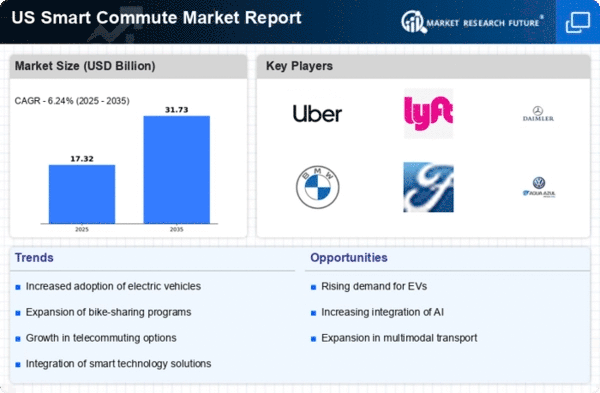Government Incentives and Policies
Government incentives and policies play a crucial role in shaping the smart commute market. Federal and state governments are increasingly implementing initiatives to promote sustainable transportation options. For instance, tax credits for electric vehicle purchases and funding for public transit improvements are becoming more common. The U.S. Department of Transportation has allocated over $1 billion in grants to enhance smart transportation systems. Such financial support encourages the adoption of smart commuting technologies, which can lead to reduced emissions and improved air quality. Consequently, the smart commute market is likely to see growth as these policies foster a more favorable environment for innovation.
Urbanization and Population Growth
The rapid urbanization and population growth in the United States are driving the smart commute market. As more individuals migrate to urban areas, the demand for efficient transportation solutions increases. According to the U.S. Census Bureau, urban areas are projected to house approximately 85% of the population by 2030. This demographic shift necessitates innovative commuting options that can alleviate congestion and reduce travel times. The smart commute market is responding by developing technologies that enhance public transportation systems and promote carpooling and ridesharing services. These advancements aim to create a seamless commuting experience, thereby attracting more users to smart commuting solutions.
Rising Fuel Costs and Economic Factors
Rising fuel costs and various economic factors are influencing the smart commute market. As fuel prices fluctuate, commuters are increasingly seeking cost-effective alternatives to traditional transportation methods. The U.S. Energy Information Administration reports that gasoline prices have risen by over 30% in the past year, prompting individuals to explore options such as carpooling, public transit, and biking. This economic pressure is likely to drive demand for smart commuting solutions that offer financial savings. The smart commute market is thus positioned to benefit from this trend, as it provides innovative alternatives that align with consumers' financial considerations.
Environmental Awareness and Climate Change
Increasing environmental awareness and concerns about climate change are driving the smart commute market. As individuals become more conscious of their carbon footprints, there is a growing preference for sustainable commuting options. The smart commute market is responding by promoting electric vehicles, public transit, and non-motorized transport solutions. According to a recent survey, approximately 70% of Americans express a willingness to use public transportation if it is more environmentally friendly. This shift in consumer behavior suggests a potential for growth in smart commuting solutions that prioritize sustainability and reduce greenhouse gas emissions.
Technological Advancements in Mobility Solutions
Technological advancements are significantly influencing the smart commute market. Innovations such as mobile applications, real-time data analytics, and artificial intelligence are transforming how individuals plan and execute their commutes. The integration of these technologies allows for more efficient route planning and improved user experiences. For example, ride-hailing services have seen a surge in usage, with the market expected to reach $120 billion by 2025. This growth indicates a shift towards more flexible commuting options. The smart commute market is capitalizing on these trends by developing platforms that facilitate seamless connections between various modes of transportation.
















